Over 30 years of anarchist writing from Ireland listed under hundreds of topics
The Left
What kind of democracy for the Arab world?
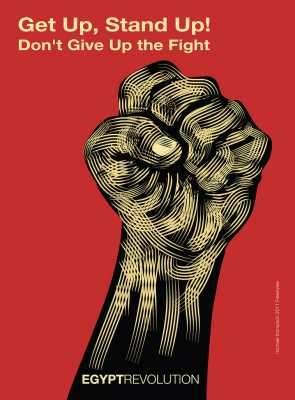 In a previous article, I said that the events shaking the Arab world today are as relevant as those that shook the world in 1989 [1]. Not only can parallels be made on the extent and depth of discontent over a vast geographical area, but also because this whirlwind of popular fury places a question mark over a particular geopolitical architecture that was hitherto believed to be as strong as steel. In this case, these long-standing dictatorships were fed, promoted and installed by the geo-strategic interests of the USA (and its junior partner, the EU) in an area of critical concern as far as oil is concerned. In 1989 the political consequences of the demonstrations were deep and long-lasting - the fall of "real socialist" regimes not only meant the fall of a few unpleasant bureaucratic dictatorships, but because of the relative weakness of a truly libertarian and revolutionary Left, represented the fall of a set of political values and horizons that were incorrectly associated with the Soviet bloc, and the overwhelming rise of neo-liberalism as the unquestioned system in the economic, political, values and ideological field.
In a previous article, I said that the events shaking the Arab world today are as relevant as those that shook the world in 1989 [1]. Not only can parallels be made on the extent and depth of discontent over a vast geographical area, but also because this whirlwind of popular fury places a question mark over a particular geopolitical architecture that was hitherto believed to be as strong as steel. In this case, these long-standing dictatorships were fed, promoted and installed by the geo-strategic interests of the USA (and its junior partner, the EU) in an area of critical concern as far as oil is concerned. In 1989 the political consequences of the demonstrations were deep and long-lasting - the fall of "real socialist" regimes not only meant the fall of a few unpleasant bureaucratic dictatorships, but because of the relative weakness of a truly libertarian and revolutionary Left, represented the fall of a set of political values and horizons that were incorrectly associated with the Soviet bloc, and the overwhelming rise of neo-liberalism as the unquestioned system in the economic, political, values and ideological field.
Reading Group Night: 'Das Kapital' Marx Reading Group, Thursday, June 16, 7pm @ solidaritybooks
Starting in Solidarity Books on Thursday the 16th of June is a reading group for Karl Marx's Capital (or 'Das Kapital' in the original German) Volume 1. For 13 Thursdays we will work our way through the book with the help of David Harvey's 'Capital' lecture series, available here: http://davidharvey.org/reading-capital/. Whatever your politics, you're welcome to come along and engage with this massively important piece of work.
The Arab Spring, News and Reflections from an anarchist eyewitness perspective - audio
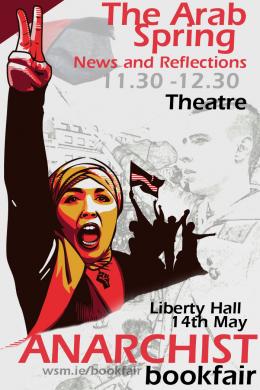 José Antonio Gutiérrez Danton returned from Egypt with news of the state of the struggle for greater freedom in the post-Mubarak era to give this presentation at the 2011 Dublin anarchist bookfair.
José Antonio Gutiérrez Danton returned from Egypt with news of the state of the struggle for greater freedom in the post-Mubarak era to give this presentation at the 2011 Dublin anarchist bookfair.
Moments of Excess; Movements, Protest and Everyday Life - Review:
 In November 1999 a new cycle of struggles burst into the media consciousness of the world with the spectacle of anti-WTO protesters confronting police in the streets of Seattle. In fact this was a cycle that had first raised its head in England earlier that year when astonished TV viewers turned on the news on June 18th to discover that the City of London was under siege by ‘anti-capitalist’ protestors, the first time that term had ever been heard in media reporting. ‘Moments of Excess’ is a collection of texts by the Free Association written from 2001 to 2011 paralleling this cycle of struggles, of the so-called anti-globalisation or counter-globalisation movement with its succession of counter-summit mobilisations from Seattle, Prague, Genoa, Evian, Gleneagles and Heiligendamm amongst others.
In November 1999 a new cycle of struggles burst into the media consciousness of the world with the spectacle of anti-WTO protesters confronting police in the streets of Seattle. In fact this was a cycle that had first raised its head in England earlier that year when astonished TV viewers turned on the news on June 18th to discover that the City of London was under siege by ‘anti-capitalist’ protestors, the first time that term had ever been heard in media reporting. ‘Moments of Excess’ is a collection of texts by the Free Association written from 2001 to 2011 paralleling this cycle of struggles, of the so-called anti-globalisation or counter-globalisation movement with its succession of counter-summit mobilisations from Seattle, Prague, Genoa, Evian, Gleneagles and Heiligendamm amongst others.
Spanish revolution on the streets of Cork...Again!
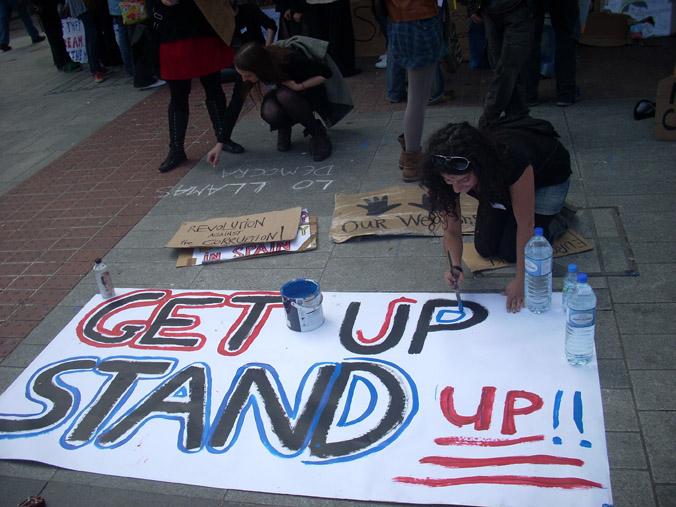
Following on from Saturday's Spanish Revolution solidarity protest in Cork City there was another big crowd on the street of the city Sunday. As the issues that have brought the people of Spain out to protest are just like those affecting people in Ireland and across Europe, there was many calls to make this movement international.
The solidarity group here plan to return to the Grand Parade every day this week to hand out information and discuss the events in Spain with passersby. This will be between 11am and 1pm, and from 6pm to 8pm. Come along and find out what's going on!
Anarchist writings on Irish Republicanism
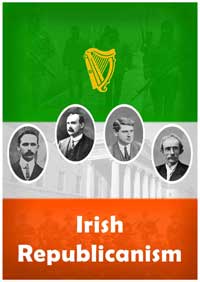 Since our formation in 1984 the WSM has produced over a hundred articles providing an analysis of Irish Republicanism from an anarchist perspective. These have ranged from analysis of the issues of the day (eg the Peace process or the targeting of building workers) to detailed re-examination of the history of the republican rebellions and movements. You can find many of there articles in our Irish Republicanism collection of articles on this site along with some of the key documents of Irish republicanism.
Since our formation in 1984 the WSM has produced over a hundred articles providing an analysis of Irish Republicanism from an anarchist perspective. These have ranged from analysis of the issues of the day (eg the Peace process or the targeting of building workers) to detailed re-examination of the history of the republican rebellions and movements. You can find many of there articles in our Irish Republicanism collection of articles on this site along with some of the key documents of Irish republicanism.
Other related article collections include those on Loyalism, the 1916 rebellion, the 'Peace Process' & Sinn Fein. We are in the process of creating these collections, use the search box to find additional articles or check the Imperialism listing which currently contains 150+ articles.
May Day 2011 Celebrations in Cork
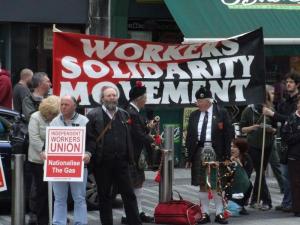
The British royals - outdated, anti-democratic & unwelcome
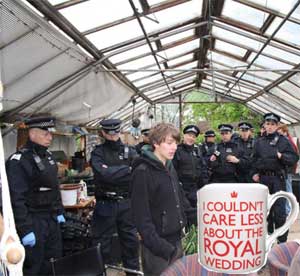 As Gardaí go door to door in central Dublin trying to intimidate any residents who might be tempted to protest against the visit of the British queen, their colleagues in Britain have mounted raids on social centers and squats across London. Five social centers were raided this morning in London and over 60 anarchists have been banned from the centre of the London on the day of the wedding of Liz's parasitic offspring. Cops used battering rams to raid 3 further houses in Hove.
As Gardaí go door to door in central Dublin trying to intimidate any residents who might be tempted to protest against the visit of the British queen, their colleagues in Britain have mounted raids on social centers and squats across London. Five social centers were raided this morning in London and over 60 anarchists have been banned from the centre of the London on the day of the wedding of Liz's parasitic offspring. Cops used battering rams to raid 3 further houses in Hove.
Review: Springtime, the New Student Rebellions
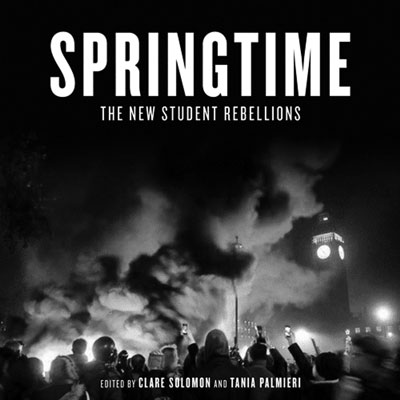 The autumn and winter of 2010 saw the sudden and dramatic re-emergence of radical student movements, with mass student uprisings taking place across Europe and the United States in opposition to both the austerity measures being levelled against ordinary people as a result of the crisis in capitalism, and the neoliberal restructuring of education according to the needs of capital. Across the Western world, governments are introducing measures to transform universities into “factories of precarious workers” - institutions devoted to the production of graduates equipped with the skills and ideas desired by industries increasingly reliant on immaterial and mental labour, turning ideas into profits. These employees must be willing to work in increasingly precarious situations, either entirely unpaid, or for increasingly low wages on increasingly short-terms contracts – a transformation that is increasingly meeting resistance from both students and academic staff, and which has only accelerated since the present crisis began. Meanwhile, in the Arab world, students have played a key role in the mass uprisings to topple Western-backed thugs such as Zine Ben Ali and Hosni Mubarak.
The autumn and winter of 2010 saw the sudden and dramatic re-emergence of radical student movements, with mass student uprisings taking place across Europe and the United States in opposition to both the austerity measures being levelled against ordinary people as a result of the crisis in capitalism, and the neoliberal restructuring of education according to the needs of capital. Across the Western world, governments are introducing measures to transform universities into “factories of precarious workers” - institutions devoted to the production of graduates equipped with the skills and ideas desired by industries increasingly reliant on immaterial and mental labour, turning ideas into profits. These employees must be willing to work in increasingly precarious situations, either entirely unpaid, or for increasingly low wages on increasingly short-terms contracts – a transformation that is increasingly meeting resistance from both students and academic staff, and which has only accelerated since the present crisis began. Meanwhile, in the Arab world, students have played a key role in the mass uprisings to topple Western-backed thugs such as Zine Ben Ali and Hosni Mubarak.
Why We Celebrate Mayday
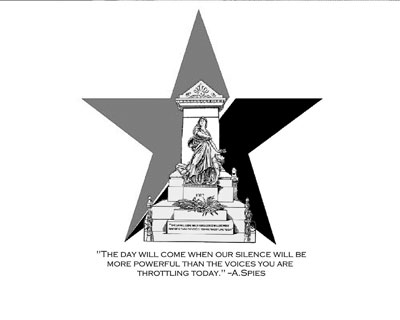 The struggle against capitalism and authority is constant but each year on May Day the labour movement takes time out to celebrate its history and achievements. Rather than dwell on the hardships of struggle we take to the streets and remember what it is we are aiming for - the emancipation of our class. Climbing a mountain means paying close attention to the ground you walk but it’s important to look up now and again in order to focus on exactly where it is you’re headed.
The struggle against capitalism and authority is constant but each year on May Day the labour movement takes time out to celebrate its history and achievements. Rather than dwell on the hardships of struggle we take to the streets and remember what it is we are aiming for - the emancipation of our class. Climbing a mountain means paying close attention to the ground you walk but it’s important to look up now and again in order to focus on exactly where it is you’re headed.

